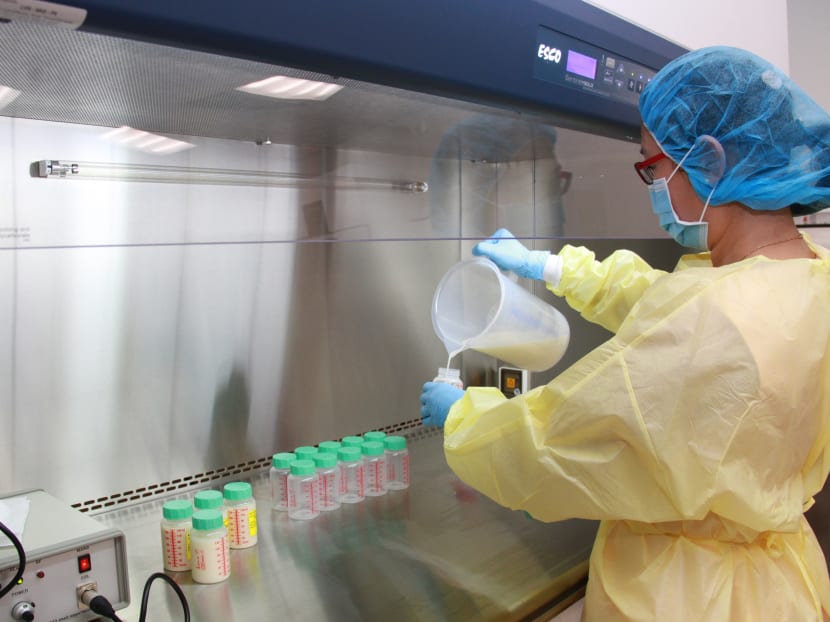KKH launches Singapore’s first human milk bank
SINGAPORE — Premature and very sick babies here whose mothers cannot produce enough milk will be able to safely draw from Singapore’s first human milk bank, which was launched on Thursday (Aug 17).

Singapore’s first human milk bank was launched on Thursday (Aug 17) as part of a new three-year pilot between KK Women’s and Children’s Hospital (KKH) and Temasek Foundation Cares. Photo: Esther Leong/TODAY
SINGAPORE — Premature and very sick babies here whose mothers cannot produce enough milk will be able to safely draw from Singapore’s first human milk bank, which was launched on Thursday (Aug 17).
The three-year pilot programme will first benefit citizen and permanent resident babies born in KK Women’s and Children’s Hospital (KKH), which will collect, screen, process and store the donated breast milk.
Babies born in Singapore General Hospital and National University Hospital will be included from the second year. The S$1.37 million programme, funded by philanthropic entity Temasek Foundation Cares and managed by KKH, aims to benefit 900 babies and recruit 375 donors over the three years. Donors should ideally be exclusively breastfeeding, and have babies less than a year old.
The milk will be given free-of-charge. Eligible babies must be born at less than 32 weeks, weigh no more than 1.8kg at birth and be at high risk of, or diagnosed with, a lethal gut condition called necrotising enterocolitis.
The condition, where intestines can become damaged due to tissue death, may lead to severe illness and even death.
Currently, about 350 infants with very low birth weight receive neonatal intensive care in Singapore’s public hospitals each year.
At KKH, up to 80 per cent of the sick babies in its neonatal intensive care unit and Special Care Nursery receive formula milk meant for premature babies — either exclusively or partially — during their hospital stay. This is due to inadequate supply of breast milk from their own mothers.
The programme aims to eventually expand to other hospitals, including private ones, to create a national milk bank.
Donors will go through a stringent screening process and learn about the handling and storage of breast milk.
Potential donors will be interviewed and tested for the human immunodeficiency virus (HIV), Hepatitis B and C and syphilis, for instance. Other criteria include not smoking or using illegal drugs. The women will express the milk at home, before freezing and taking it to the milk bank.
The milk will be pasteurised, tested for bacterial contamination and stored in the freezer — according to strict international guidelines — until it is used.
Babies will stop receiving the donated breast milk once their mothers have established their own milk supply, when they are more than 34 weeks old, or when discharged from hospital.
Dr Chua Mei Chien, head and senior consultant at KKH’s Department of Neonatology, said breast milk is the nutritional standard for infants in their first six months.
It contains white blood cells and antibodies that can protect the baby against infections.
As premature babies tend to have weak immunity and digestive systems, formula milk exposes them to feeding intolerance and higher risk of necrotising enterocolitis.
Breast milk is actively traded here on informal sharing platforms like Human Milk for Human Babies-Singapore, but Dr Chua said the donors are not screened and there is no guarantee the milk collection methods adhere to certain hygiene standards, which poses the risk of disease transmission.
The Donor Human Milk Bank programme was launched by former Speaker of Parliament and potential presidential candidate Halimah Yacob. Singapore joins more than 30 other countries worldwide with 500 milk banks. For instance, in Tamil Nadu, India, a human milk bank was started in August 2015 by the state government, helping to boost the neonatal survival rate to 85 per cent. Australia started the Mothers’ Milk Bank in 2009.
A milk bank would ensure more regulation and less health risks for recipient babies, said Dr Ian Ong of Thomson Paediatric Centre (Katong).
Breast milk is the “gold standard” for infants in the first six months of life, especially pre-term infants, as it is “easiest to digest and most tolerable for infants”, he said.
Among the mums eager to donate their extra milk is KKH staff nurse Tan Mei Yu, 31, who has an eight-month-old son. She often pumps 300ml to 400 ml in excess each time and has to store the milk in her freezer until it “runs out of space”.
Ms Tan has had to throw away expired milk and drive up to Johor Baru in Malaysia to donate her frozen milk stash to friends. “I know there’re a lot of premature babies in the hospital,” she said. “If I can help, why not?”
Fellow donor and mother of a one-month-old daughter Mrs Subashree, 33, said a milk bank would lend “proper protocols” to the practice of milk sharing. “Breast milk is friendly on the tummy ... It will help give these babies more immunity,” she said.









